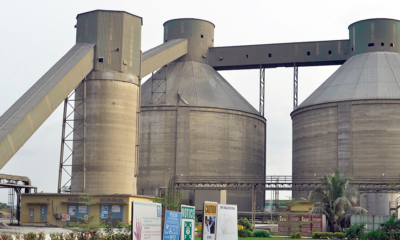Finance
CBN Plans Revival of Moribund Manufacturing Companies with N500bn
Published
7 years agoon

- CBN Plans Revival of Moribund Manufacturing Companies with N500bn
Determined to significantly boost the contribution of the non-oil sector to Nigeria’s Gross Domestic Product (GDP), the Central Bank of Nigeria (CBN) has said it plans to revive moribund firms in the non-oil export business through its N500 billion export stimulation facility.
CBN Governor, Mr. Godwin Emefiele, disclosed this plan Friday night when he spoke with journalists after meeting with stakeholders in the non-oil export business.
Also, yesterday at the ninth annual bankers’ committee retreat Emefiele urged management of deposit money banks and other members of the Bankers’ Committee to ensure that they focus on initiatives that would touch the lives of Nigerians and contribute significantly to the country’s GDP.
The governor explained that the purpose of the meeting with the exporters and the banks was to look at areas the CBN could support the activities of exporters in the country to boost earnings from the sector.
“The basic issue is that we have decided to bring back to the table the N500 billion Export Stimulation Facility that we had proposed two years ago, as well as the N50 billion Direct Intervention Fund from the Nigeria Export-Import Bank (NEXIM).
“We also know that there are some of the Nigerian companies that have benefited from some of our export stimulations facilities in the past and some of them still remain moribund, and we have also told our Development Finance Department to take a look at companies like Multi-trex and another company that is also into cocoa processing that is somewhere in Ibadan.
“We are going to be working with them to see that we really get their production back on track. By doing this we are going to be creating more jobs for our people.
“Other than just creating jobs, we will see that it will afford opportunity to increase our export earnings for the good of the country because those export earnings are also necessary,” he said.
Emefiele pointed out that since the last two years when the country saw significant drop in its revenue as a result of the slide in crude oil prices, the central bank and federal government had been thinking of various means to raise its non-oil revenue so as to be able to withstand shocks.
According to Emefiele, the new management of NEXIM had displayed clear understanding of the issues affecting the non-oil sector. He hinted that the CBN’s Development Finance Department as well as his Special Adviser on Agriculture would, in the next one week, put together a framework on how the funds would be disbursed.
Under this programme, Emefiele said the acronym -PAVE- Produce, Add Value and Export, had been re-introduced.
“So, we had a lot of engagements with the exporters and we would be looking at various products in the non-oil sector: cocoa, cashew nuts, palm produce, sesame seeds, solid minerals and rubber.
“We are saying that to create jobs for our people, there is a need is a need for us to advance further to value addition and begin to talk about processing of exportable items like rather than export raw cashew. We are thinking of exporting processed cashew. Rather than export raw cocoa, we are thinking of giving support to companies that process cocoa to cocoa butter and cakes and all that.”
Furthermore, Emefiele said it was agreed at the meeting that there were some elements of undocumented export transactions. According to him, the exporters agreed to put a stop to the incidence of undocumented exports.
He stressed that all transactions that would receive funding from the CBN would be for documented export transactions only, saying before the facilities would be provided to the exporters, they would commit through their banks or through NEXIM that they would repatriate the forex.
“So, we are saying that the source of revenue into the country should not just be oil, neither should it just be foreign portfolio investments or foreign direct investment alone,” he stated.
The CBN Governor also disclosed plan to set up an Anchor Borrowers’ Programme (ABP) for non-oil exporters.
“Here, we are saying for instance that we have so many cocoa farmers, primary rubber producers or palm oil producers who are in the villages or in the communities and we are saying that we are going to develop a framework that would make finance available to them through NEXIM and through the framework to be set up, where they can access some intervention funds.
“The export companies would act as their off takers and anchors. For instance, you have a farmer in the village or a couple of farmers that have a cooperative, what happens is that the cooperative would work with the cocoa exporters and the exporters would be the off-taker of the cocoa produce, but the funding would pass through the central bank to the banks or through NEXIM, and goes through the exporters to the primary farmers.
“With that there is an opportunity to off-take those products from the farmers. But the details of the framework would be worked out. “But I can say that it is also part of the encouragement we have received from government that let all we are doing not be about rice, tomato or maize, but that lets go to other areas where there are cash crops like cocoa, rubber, to export, earn foreign exchange to lubricate and run our economy,” he added.
According to Emefiele, the plan also covers the solid minerals sector.
Delivering a welcome address at the bankers’ committee retreat in Lagos, with the theme: “Improving Financial Access, Job Creation and Inclusive Growth in Nigeria,” Emefiele pointed out that until Nigeria’s economic growth move higher than four per cent, it may be difficult to feel the impact of public policies.
Specifically, he told his audience at the meeting, which also had in attendance the Governors of Lagos, Jigawa and Kebbi as well as the Minister of Agriculture that: “Growth must be seen to exceed four per cent, before we can say it has started permeating the lives and well-being of our people.”
The National Bureau of Statistics (NBS) recently revealed that the Nigerian economy grew by 1.4 per cent in the third quarter (Q3) of this year, higher than the revised growth rate of 0.72 per cent recorded in the second quarter.
But Emefiele stressed the need for members of the Bankers’ Committee to ensure they continue to play their financial intermediation role to achieve this.
“In the last three years, the central bank has its N220 billion micro, small and medium scale enterprises development funds (MSMEDF) available.
“But as I speak, just less than 50 per cent of this fund has been drawn. But when we tell people that these fund is available at nine per cent, they keep asking for the fund.
“So, there is a gap. We have these funds while people on the other side are saying they haven’t seen the fund. So, there is a disconnect. And those who rightfully stand in a position to do this are all of us.
“We should stand and be counted as we journey towards achieving growth in this country,” he told his audience.
According to the CBN Governor, programmes such as the Anchor Borrowers Program (ABP) has helped to drive productivity in Nigeria’s agriculture sector by providing finance to large numbers of small holder farmers across the country.
He put the total amount invested in the ABP at over N45billion, saying the program has been highly effective in improving production, by smallholder farmers of items such as rice, maize and soya beans.
In his address, Lagos State Governor, Akinwunmi Ambode, called for a low-cost, well-functioning financial system in the country.
While reacting to an earlier statement by Emefiele that the disbursement of the MSMEDF was still very low, Ambode called for a further reduction of the interest rate of the fund from the nine per cent it is presently, to about five per cent.
“As a government, we decided to create an Employment Trust Funds of N10 billion and we are giving out loans at five per cent. So, I am saying that if you want to activate a particular sector, you shut your eyes to profit-making sometimes.
“As a state, we have helped over 6,000 persons. So, if you want to touch the people at the lower level, there has to be something different for them,” he advised.
According to Ambode, for Nigeria to attain its potential, its economy must grow by 6.7 per cent per annum.
This, he said was critical to reduce the level of poverty in the country, prevent social unrest as well as unlock the full potential of the country.
Ambode frowned on what he described as over-regulation in the country. This, according to him has negative consequences on the economy. He called for a stronger collaboration among the regulators to promote access to finance in Nigeria.
Meanwhile, the CBN on Friday closed the market for the week with sale of the sum of $303.9 million in the foreign exchange market.
The breakdown of the total sales indicated that much priority was given to the real sector of the economy with the sale of 75 per cent of the day’s sales amounting to $229.89 million for raw materials and machinery.
Confirming the sales, in a statement yesterday, the Acting Director, Corporate Communications Department of the CBN, Mr. Isaac Okorafor, hinted that various sums were also offered to other vital sectors like the agriculture and airline which got $24.68 million and $12.467 million respectively, while petroleum products got 36.89 million.
On the performance of the forex market in the out-going year, the director noted with nostalgia that the naira exchange rate had not only remained stable and considerable accretion to the foreign reserves but Bank had so far met all the legitimate demands from genuine customers
In another development, one of the leading rating agencies, Fitch Ratings has cut its 2017 economic growth forecast for Nigeria to one per cent, from the 1.5 per cent it had estimated previously.
Nigeria returned to growth in the second quarter of 2017 after shrinking by 1.5 per cent in 2016 but the recovery has been fragile because oil revenues remain depressed and hard currency is short.
Speaking at a Fitch event in London, Reuters quoted the agency’s Director for Sovereigns, Jermaine Leonard, to have added that although Nigeria’s 2018 budget had an oil production target of 2.3 million barrels per day (bpd), the Fitch forecast was just above two million bpd.
This was partly linked to a potential flare up in violence in the Niger Delta as elections approach in 2019, he said.
Fitch currently rates Nigeria at B+ with a negative outlook, which reflected the fact that there were still a lot of elements which could take it down, said Leonard. “But at this point we are cautiously optimistic,” he noted.
Is the CEO and Founder of Investors King Limited. He is a seasoned foreign exchange research analyst and a published author on Yahoo Finance, Business Insider, Nasdaq, Entrepreneur.com, Investorplace, and other prominent platforms. With over two decades of experience in global financial markets, Olukoya is well-recognized in the industry.

You may like
-


Holcim to Exit Nigeria, Sells Lafarge Africa Stake to Huaxin Cement for $1 Billion
-


Investment in Nigeria’s Manufacturing Sector Rises to N250.13bn in H1 2024
-


Manufacturers Knock CBN Over 27.25% Interest Rate Hike
-


Nigeria Set to Become The First West African Manufacturing Hub for Insecticide-treated Nets in the Battle Against Malaria
-


Manufacturers Trim Losses in Q2 2024 as FX Costs Fall and Reforms Take Effect
-


Manufacturers Warn of Crisis as CBN Delays $2.4bn Foreign Exchange Contracts
Sign up for our Daily newsletter
We’ll be in your inbox every morning Monday-Saturday with all the day’s top business news, inspiring stories, best advice and reporting from Entrepreneur, To share your newsletter use this email: entrepreneuredition@



